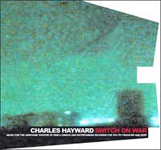|
|
 |
Dusted Reviews
Artist: Charles Hayward Album: Switch on War Label: Sub Rosa Review date: Aug. 19, 2004 |

|
|
|
 |
Switch On War opens with discorporate howling and the first semblance of a drone that’s felt, if not actually heard, throughout the record. Charles Hayward gained acclaim as drummer for seminal British art rock trio This Heat, but he has since recorded a number of solo releases, including this album in 1991, subtitled “Music for the Armchair Theatre of War.” Hayward was responding to the Gulf War as it existed on the airwaves of Western television (its only form to most Westerners): Night vision TV images of bombs lighting the skies above Baghdad; the mesmerizing monotony of 24-hour dissimulation of combat. Hayward reimagined the carnage as an industrial march fundamentally corrupted by harrowing futility.
Switch On War was expected to have a shelf life as brief as the conflict itself or, at least, as brief as the public’s attention span or collective memory. Sub Rosa recently reissued the record as, ostensibly, a premonitory response to the second Bush’s war in Iraq. Consisting mainly of sterile and distant percussive clatter dispersed across a vail of organ swells, squeals and drones, the record is alternately meditative and assaulting; sometimes it manages to be both at once.
As the elder Bush’s war never really ended – it just slipped into the dreamworld of archived images and latent threats – it is appropriate that Switch On War be recycled along with the return of hostilities. Few musicians in the past few years have leveled poignant or even serious criticisms of the Bush administration – the Beastie Boys and Chuck D., among others, have issued particularly cringe-worthy fare. This alone makes Switch On War a record to relish.
Hayward attempts to portray the brute sounds cautiously avoided by the mainstream media. His metallic trance seems to point out the vacuity of a mediated reality while also capturing the psychology of the viewer. Wailed vocals don’t sound as desperate as they should. An extended snare roll marches over discombobulated organ noise at the end of “Pinpoint,” but the irony is couched in numbness, acceptance. In “Sweetheart,” interwoven tones give way to pounding distorted toms accompanied by a piercing high-end buzz – stasis and movement, fantasy and horror begin to occupy the same space.
Switch On War offers no way out. In fact, it reinforces and reanimates what we might have forgotten over the past decade, that the nightmare wasn’t just a bad dream. The tendency of government and compliant media to reduce the reality of war to a series of disarticulated images and restrictive narratives has only gotten worse since 1991, making Hayward’s dead end all the more relevant. It is an important sidebar temporarily plucked from the dustbins of history; though it would seem a paroxysm whose meaning is destined to once again fade from our collective consciousness like so many press conferences, terror alerts and dead soldiers' names, the sad irony of Switch On War's continuing relevance suggests that a record can compel one to fight the urge to forget.
By Alexander Provan
|







